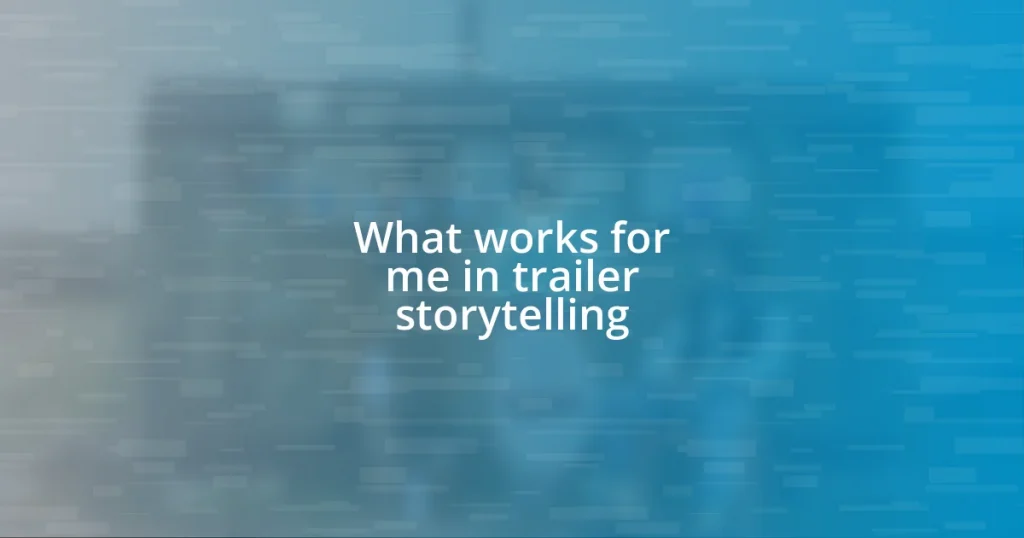Key takeaways:
- Humor in trailers effectively captures audience attention and provides insight into characters and themes through relatable situations and timing.
- Successful humorous trailers combine relatable scenarios, contrasting character dynamics, and clever juxtaposition of serious and absurd moments.
- Caution is needed to avoid pitfalls such as over-saturation with jokes, inconsistent tone, and misleading humor, while focusing on timing and universal experiences enhances comedic impact.

Understanding humor in trailers
Humor in trailers serves as a powerful tool to capture the audience’s attention. I remember watching a trailer for a comedy movie last year that had me laughing within seconds. It pulled me in, making me feel a connection to the film’s vibe long before it hit theaters.
In my experience, the timing of jokes in trailers is crucial; just a well-placed pause can heighten the comedic effect. Have you ever noticed how some trailers play on unexpected punchlines? When a character delivers a line that completely flips the scene’s tone, it gives us a taste of the film’s unique style, making me eager to see more.
Moreover, humor can also reveal a lot about a character’s personality or the movie’s themes. For instance, when I saw a trailer where the protagonist awkwardly stumbled during a serious moment, it beautifully set the tone for the film, blending comedy with relatability. Doesn’t that kind of humor resonate more with us because it feels so authentic?

Analyzing successful humorous trailers
One of the most crucial elements in humorous trailers is the use of relatable situations that mirror our own experiences. I remember watching a trailer for a romantic comedy where the main character found himself in an embarrassing scenario at a family dinner. The awkwardness was palpable and struck a chord with me; it reminded me of my own family gatherings. This connection not only made me laugh but also ignited a desire in me to see how the character would navigate such a hilarious predicament.
Successful humorous trailers often employ a clever juxtaposition of serious moments with absurd humor. Take, for example, an action film trailer where an intense fight scene was interrupted by an overzealous sidekick making a ridiculous joke. I couldn’t help but chuckle at the absurdity. It’s these unexpected moments that create a delightful tension, drawing audiences in while showcasing the film’s unique blend of genres.
Another key aspect is how humor can be amplified by character dynamics. I once saw a trailer where contrasting personalities – the straight-laced hero and the goofy best friend – created delightful banter. This dynamic not only made me laugh but also left me curious about how their relationship would unfold throughout the film. Such successful trailers showcase the potential for character development, drawing viewers into the story beyond just the initial giggles.
| Trailer | Key Humor Element |
|---|---|
| Romantic Comedy | Relatable embarrassing situations |
| Action Film | Juxtaposition of intense moments with absurd jokes |
| Buddy Comedy | Dynamic character interactions |

Common pitfalls in using humor
Humor in trailers can be a double-edged sword. If not executed properly, it can backfire and leave the audience confused or even turned off. I recall a trailer for a film that tried to cram in too many jokes, which made it feel disjointed rather than funny. It reminded me that humor should enhance, not overwhelm.
Here are some common pitfalls to avoid when using humor in trailers:
- Over-saturation with jokes: Too many punchlines can dilute their effectiveness.
- Inconsistent tone: Jokes that clash with the film’s overall mood can confuse potential viewers.
- Culturally specific references: Humor that relies on regional jokes may alienate a wider audience.
- Misleading humor: Trailers that promise humor but deliver a different type of film can create frustration.
- Characters lacking depth: If the audience doesn’t connect with the characters, the humor may fall flat.

Tips for creating humorous trailers
Creating a humorous trailer can be a delightful challenge, and one of my favorite tips is to focus on timing. I once watched a trailer where the punchline hit just as the viewer expected a serious moment, leaving the audience in fits of laughter. It reminded me that proper pacing can elevate the humor significantly—it’s not just what you say, but when you say it that really counts.
Another effective strategy is to encapsulate humor within a unique premise. I remember a particular animated film trailer that introduced a talking animal in a setting where animals typically don’t speak. The juxtaposition created instant hilarity! This approach not only sets the tone but also piques curiosity, making the viewers eager to see how this quirky idea plays out in the film. Have you ever found yourself laughing at a concept that was just so out there? That’s the power of a strong premise.
Lastly, I suggest that you tap into universal experiences when crafting your humor. I vividly recall a trailer that showcased the frustrations of everyday life—like the chaos of a morning routine gone wrong. It struck a personal note with me, as I often feel like I’m racing against time and failing. Humor that resonates with shared experiences can forge a bond with the audience, making the trailer not only funny but also relatable. How often do we laugh at our own similar situations? It’s this connection that keeps audiences engaged and excited about the film.
















